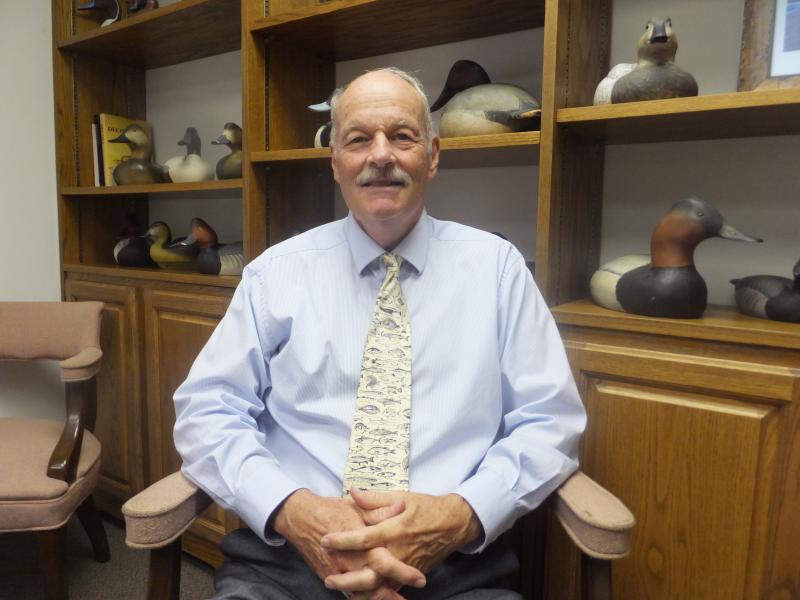Craig Karsnitz to take seat on Superior Court
Craig Karsnitz is from Chocolate Town, aka Hershey, Pa., but for him, Sussex County has turned out to be the sweetest of landing spots. After 40 years as an attorney based in Georgetown, he’s moved from his office on Pine Street to a new one at 1 The Circle.
Karsnitz was nominated by Gov. John Carney as the newest Delaware Superior Court judge. His nomination was unanimously confirmed by the Delaware Senate Oct. 3. He will serve a 12-year term on the bench. “I’m really excited about the new chapter,” he said. “I’m in a stage of my career where I would like to do a little bit of service and give something back to the system I’ve been a part of for 40 years now.”
Karsnitz’s appointment is part of a shuffling of chairs on the bench in Georgetown. Judges Jane Brady and T. Henley Graves retired within the last two years. Graves had also served as the resident judge - the ranking judge at each courthouse who ranks just below president of the judiciary - at the Georgetown court. Brady’s spot was not filled, leaving the court with only three judges until Graves announced his retirement in May.
With that, the Senate approved Carney’s nomination to promote Judge Richard F. Stokes to resident judge and appointed Karsnitz to the bench. “I was excited when I got the call from the governor, and it’s great that he has the confidence in me to be able to handle this position,” he said.
Karsnitz is a graduate of University of Delaware with a law degree from Villanova, and a lifelong Philadelphia sports fan. He first came to Sussex County to do his clerkship for Supreme Court Justice John McNeilly. In 1979, he was hired by Young Conaway Stargatt and Taylor, where he was been ever since.
Karsnitz said his interest in the law came from his love of the famous TV character Perry Mason. “He always got the right result. He always helped people, and that looked good to me. As I got older, I saw a lot of things lawyers did and the ability to help people, and it seemed like an interesting way to make a living.
“Every day you’re doing something different, and every day you’re dealing with different people.”
He said part of what makes a successful lawyer is figuring out what motivates people and why they make the decisions they do.
Perhaps Karsnitz’s most well-known case was defending Linda Charbonneau, who was accused of masterminding the murders of two of her husbands. Charbonneau was convicted in 2004 and given the death penalty, which was legal at the time. In 2006, he appealed the verdict, and Charbonneau’s conviction was overturned on a technicality by Delaware Supreme Court. She later pleaded guilty to second-degree murder, for which she is serving a 25-year prison sentence.
“One of the hard things in that case was finding out why people did what they did and why they made the choices that they did, and why they thought those choices would be productive in their life.”
“I said to the Senate at my confirmation hearing, ‘I’m nervous, but not as nervous as I was standing in front of a jury arguing for my client’s life,’” he said.
“When the whole objective of the other side of the courtroom is to kill your client, it puts a whole other perspective on things.”
Besides the courtroom, Karsnitz’s legal work also extended to municipal law, serving as the solicitor for the Rehoboth Beach Board of Adjustment for more than 30 years. As solicitor, his job was to advise the board to help make decisions, as the board is a quasi-judicial body whose rulings are directly appealable to Delaware Superior Court.
Karsnitz said he had never done municipal law before getting appointed as solicitor in 1986. “That was always interesting. It’s a little slice of democracy. It’s a circumstance where people are able to come in and say what they want, and they get to deal with lots of issues regarding their homes and their buildings.”
He viewed his job as examining the town code to ensure that ordinances were being interpreted correctly so that property owners had a clear picture of what was allowed and what was not.
For more than 20 of his 32 years as solicitor, Karsnitz was seated alongside board Chairman Tom Evans. Karsnitz and Evans announced their resignations from the board in June after a contentious meeting. “I knew that there was a possibility that I would get a position with the court,” Karsnitz said of his resignation. “I had been there a long time. The night in question was frustrating with the position the city was taking, and I just decided that night that it was time for me to move on.”
Karsnitz has been married to his wife, Kathi, for 43 years. They have two sons, Ross and Tristan, both attorneys themselves.
As he takes his seat on the bench, Karsnitz knows he has a big job ahead of him, but one he is ready for. “I look forward to using my experience in that court to make the transition as smooth as possible. I hope I get started as soon as possible and keep things functioning there as best we can,” he said.
Ryan Mavity covers Milton and the court system. He is married to Rachel Swick Mavity and has two kids, Alex and Jane. Ryan started with the Cape Gazette all the way back in February 2007, previously covering the City of Rehoboth Beach. A native of Easton, Md. and graduate of Towson University, Ryan enjoys watching the Baltimore Ravens, Washington Capitals and Baltimore Orioles in his spare time.























































